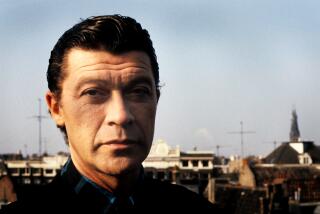In Nazareth, Taking a Load Off ‘The Weight’
- Share via
The first line of The Band’s classic-rock staple “The Weight” draws a clear, almost cinematic picture of a lonely traveler pulling into a town called Nazareth.
But which Nazareth?
Did songwriter Robbie Robertson base the song on the Pennsylvania borough, the biblical town, or some other Nazareth? And is the song’s story of generosity gone wrong based on real-life events?
Had “The Weight” been a here-today, gone-tomorrow pop single, those questions might not matter.
But the song, released in 1968, was named one of the top 50 songs of all time by Rolling Stone magazine. It’s been re-recorded by artists as diverse as Aretha Franklin and Waylon Jennings. It’s still played on classic-rock radio and appears in national ad campaigns, such as the long-running Cingular Wireless ads that recently brought it new prominence.
“I think it’s a great song. I think it’s a timeless song,” said A.J. Fritz, manager of WLVR-FM, the radio station at Lehigh University in Bethlehem, Pa.
The Nazareth question has special meaning to the Lehigh Valley, a region not known for inspiring hit songs. In an area still bristling from Billy Joel’s bleak 1982 song “Allentown,” another popular song with ties to the valley might come as a relief.
So, was Robertson’s Nazareth the Pennsylvania Nazareth?
The real story of “The Weight” starts not at the answer, but at the beginning -- with a road-weary young musician, hunched over an acoustic guitar, waiting for inspiration.
I just need some place
where I can lay my head.
By 1967, Robbie Robertson knew a lot about the road.
Guitarist Robertson and his four colleagues in The Band had spent much of the previous decade as touring sidemen, first to rockabilly wild man Ronnie Hawkins, then to Bob Dylan. Dylan played concert halls, but Hawkins set up just about anywhere he found a bar.
That summer and fall, though, group members settled around “Big Pink,” a modest house in the Catskill Mountains town of West Saugerties, N.Y. The Band began to plot its own career, which meant writing its own songs. And Robertson, the member closest to Dylan, began to take the lead.
The lyrics penned by the Toronto-born guitarist showed a fascination with storytelling. Or, more specifically, folklore -- stories handed down through generations, with truth and fiction blurred to create a sense of mystery.
“There’s something Robbie was trying to capture, of being a storyteller in a very American sense,” said Todd Wolfe, a professional rock guitarist, Lehigh Valley resident and devoted Band fan.
“The Weight,” picked out by Robertson on a Martin D-28 guitar in the summer or fall of 1967, emerged as its own shadowy, self-contained folk tale.
Over a simple, countryish backdrop of piano and strummed guitar, drummer Levon Helm and bass player Rick Danko took turns singing the part of a hapless narrator visiting an unfamiliar town. Helm’s weary Arkansas drawl takes most of the verses.
In the first verse, the only one that mentions Nazareth by name, the exhausted narrator asks for a place to sleep. He is rebuffed by a local:
He just grinned and shook my hand
And ‘No!’ was all he said.
Later verses find the singer set upon by colorful strangers -- Carmen, Luke, Crazy Chester -- all asking for favors. One asks him to keep a friend company, another to take care of his dog.
On the chorus, in stacked harmony, Helm, Danko and pianist Richard Manuel bemoan the burdens of kindness:
Take a load off Fanny,
Take a load for free,
Take a load off Fanny,
And (and) (and) you put the load right on me.
Robertson would later say the song was about “the impossibility of sainthood,” or the difficulty of living up to the world’s demands. A cinema buff, Robertson would cite the work of Spanish filmmaker Luis Bunuel for part of the song’s inspiration.
Catch a cannonball now,
t’take me down the line.
Not surprisingly, the pop charts of the day had little room for an enigmatic small-town tale inspired by an art-house filmmaker. “The Weight” didn’t make the Billboard Top 40 when released as a single in September 1968.
But The Band’s similarly homespun debut album, “Music From Big Pink,” attracted musicians who began to cover “The Weight.” Aretha Franklin’s version cracked the Top 20 the following year. Gospel group the Staple Singers and R&B; saxophonist King Curtis also cut versions.
The song’s use in the 1969 counterculture movie “Easy Rider” helped cement it as a defining song of its generation. It also played in 1983’s “The Big Chill,” another iconic movie that summarized the thoughts and experiences of baby boomers.
Today, like other classic-rock favorites, the song appeals to advertisers. Most recently, Cingular Wireless used the first verse for a long-running campaign that showed a man driving cross-country to reunite with his wife or girlfriend.
Vance Overbey, Cingular’s executive director of advertising, said ad agency BBDO went through “hundreds, if not thousands” of songs. “The Weight” was a clear choice to accompany the man’s trip, he said.
“That song just stuck with us,” he said. “It’s such a likable song, and it transcends generations, as well. ... It seemed to fit with the story we were telling.”
The song’s mystery has endured along with its appeal. Ever since “The Weight” was released, Band fans have debated its meaning -- and its setting in place and time.
To some listeners, the first verse suggested the biblical story of Joseph and Mary, forced to sleep in a stable. Others imagined a contemporary ‘60s tale, recounting the real-life struggles of an unwelcome traveler, perhaps a shaggy-haired musician arriving in a small town like Nazareth.
A cold shoulder would not have been out of character for the tightknit Nazareth of the 1960s, some in town say.
“The people here are ultra-conservative kind of people,” said Mayor Earl Keller, a resident since 1961. “Going back to that era, we were really clannish. ... They would have definitely done that.”
Peter Viney, a Band fan from Great Britain, wrote a lengthy article dissecting the song’s lyrics for a website, theband.hiof.no. Viney said the song suggests the dusty Old West to him, while others imagine a Faulkneresque Southern setting. The meaning of the lyrics also is a matter of interpretation, with different listeners hearing everything from biblical connotations to drug or sexual references.
But few listeners seem to know enough about Nazareth, Pa., to make much of a connection beyond the name.
Even local guitarist Wolfe, who once played “The Weight” onstage with Levon Helm, drew no connection to the Lehigh Valley. Wolfe always imagined the song was set in the South, mainly because the group chose its only Southern member to sing.
My bag is sinkin’ low
and I do believe it’s time.
Wolfe was surprised to hear he was wrong. The Nazareth in “The Weight” is indeed inspired by Nazareth, Pa., although the song is not based on any real-life visit.
To unlock the mystery, go back to 1967 and examine the guitar Robertson used to write “The Weight.” It was a 1951 Martin, made by C.F. Martin & Co., the well-known guitar maker. The company was based in Nazareth when it made Robertson’s guitar, though it moved to Upper Nazareth Township in 1964.
Robertson, who declined a request for an interview, recently told the true story behind “The Weight” to Dick Boak, Martin’s artist relations manager. Boak is talking with the guitarist about a possible Robbie Robertson signature-model guitar.
According to Boak, Robertson told him he was working on “The Weight” when he looked at the label inside the soundhole of his Martin guitar. He liked the ring of the name “Nazareth, Pa.,” and decided to use it.
“He said the guitar gave him the first line of the song, and everything flowed from there,” Boak said.
More to Read
The biggest entertainment stories
Get our big stories about Hollywood, film, television, music, arts, culture and more right in your inbox as soon as they publish.
You may occasionally receive promotional content from the Los Angeles Times.







